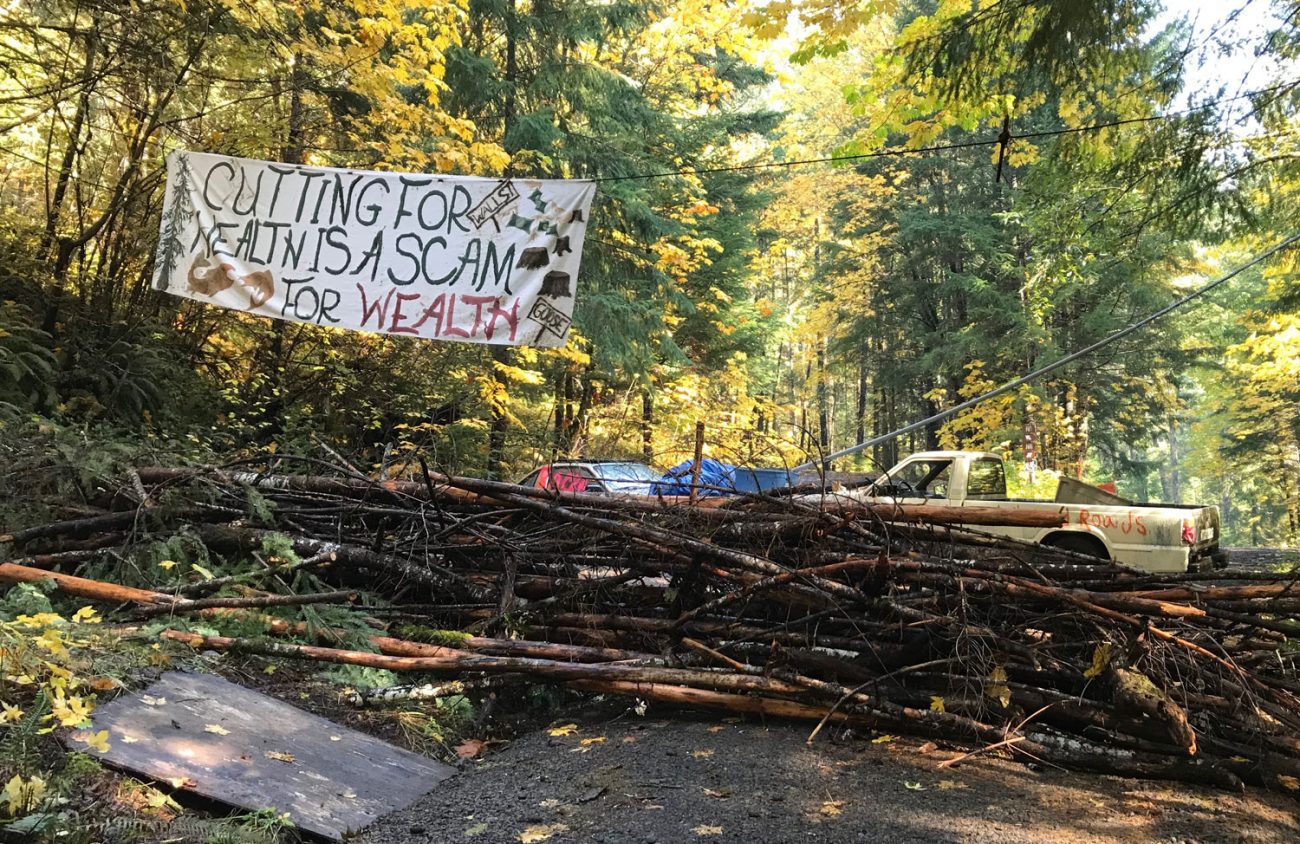Suspended high in the canopy over the Willamette National Forest on a platform, an activist sits, putting his life on the line. The rope holding him in the air is connected to an anchor — a box full of concrete and two vehicles that form a blockade on the timber road.
If any part of this intricate set-up is moved, the activist could plummet to his death.
Prof, a Cascadia Forest Defender (CFD) going by his “forest name,” says this set-up is called the dunk tank. Forest names are pseudonyms used by forest activists who are aware their activities could lead to arrest or prosecution.
We’re standing in the middle of the woods off Highway 126 near the McKenzie General Store, about 50 miles east of Eugene, and these activists are trying to save this portion of the forest called the Goose Project. A tree sale called the W Timber Sale is within it.
This project was proposed in 2009, but the sale of these 2,500-some acres to Seneca Jones Timber Company wasn’t finalized until January, according to Scrimshaw, a tall man with glasses and long blond hair — he’s also using a forest name.
“We’ve been sitting in a tree since May, and the new development is that we’re blocking the road now so loggers can’t come in and drive in,” Scrimshaw says. “They started cutting last Tuesday, and I think they’ve been working every day since.”
EW visited the blockade Monday, Oct. 23. Two legal observers from the Civil Liberties Defense Center were also in attendance, as were two law enforcement officials from the federal Forest Service.
As EW went to press Oct. 25, several trucks rolled up to the blockade and cut the rope anchor and towed one of the anchor trucks away, “despite our yelling about the mortal danger,” Scrimshaw says. He adds that CFD filmed the event.
Scrimshaw says the sitter was unharmed and “all of us packed up and left.” He says as CFD left, they passed Forest Service law enforcement vehicles on their way to the block site.
Jude McHugh, a spokeswoman for the Willamette National Forest, spoke to EW before the blockade was removed, saying, “Our only interest is to resolve the situation, and of course to protect everyone’s civil rights as we do so.”
McHugh says the blockade was preventing citizens from using the area for hunting, recreational driving, hiking and legal business purposes. “It’s my understanding that the law enforcement officials out there have asked the protesters questions and that the protesters have by-and-large declined to comment,” she adds.
Scrimshaw says there’s a long history of various groups trying to prevent this sale from going through, which EW covered in June of 2017 (“The Forest for the Trees”). “It’s public land, it belongs to United States citizens. The timber is being sold,” he says. “The land will stay public, but it’s being cut over.”
This is far from the first time Seneca and CFD have butted heads. In 2014, The Oregonian reported that Seneca bid on a timber sale in the Elliott State Forest, not because it needed the trees, but because CFD had threatened lawsuits and tree sits.
According to Sylvan, another Cascadia Forest Defender using a forest name, “We give up on the idea that if we ask you nicely, you’ll not destroy our public resources. So we’re going to have to stop you, and nothing else will stop you until our bodies are in the way.”
She adds that this forest needs protecting because several streams that run through the timber sale feed into the McKenzie River. “They’re doing some clearing in riparian reserves, supposedly to improve them for water quality. But it’s commercial logging,” she says, meant for profits, not for forest health.
On day one of this direct action, Prof says he dealt with heckling loggers just before sunrise. He says they weren’t too happy to be without work, and they called law enforcement. Officers arrived around 10:30 am, and the loggers left soon after.
As of 2 pm that day, law enforcement had left as well, and the activists were planning their next moves.
Prof left the area to get some sleep, but says he was attacked as he walked down the logging roads towards his car. “So I was walking back from Goose tree sit, and this guy came around in his white truck,” he says. “He jumped out and like threatened me.”
Soon after the alleged attack, the truck stopped near another group of workers close to some logging equipment, and the driver got out of the vehicle to speak to them.
“He came by me like three times,” Prof says, visibly shaken. “And then he kicked me in the stomach.”
“He tried to attack me twice,” he says, “while his friend stood there with a gun to ensure that if I defended myself I’d probably get shot.”
EW contacted Seneca Jones Timber Company, but their representative was not able to answer before press time.
But for the activists, the danger is worth it to protect the forest. “Old growth forests are natural habitats for a lot of species,” Prof says. “My personal reason for doing this is that I want to preserve biodiversity in forests.”
Scrimshaw is similarly committed. “I am opposed to resource extraction. I am opposed to institutional corporate land management. It’s just part of the ongoing ecocide.”
He says he values the forest he’s standing in. “I can feel when I’m out here that it’s a life-giving place. I want to be out here.”
